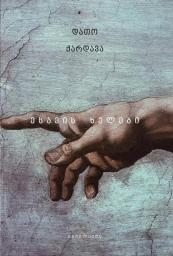ESAU’S HANDS
KARDAVA DATO
The grotesque which saturates Dato Kardava’s novellas not only gives the reader pleasure: it leaves him with a very special thought, a sadness, and this is why he can be read several times over. Dato Kardava has a peculiar way of portraying his own characters. On the whole, they always have comic attributes, they are caricatures, the author apparently distrusts them, but this mocking tone which accompanies his characterisation, can suddenly vanish and the intonation and attitude to the character in the narrative can change diametrically, even though at times there still is a flash of sarcasm in the texts. This ambivalence, this change of focus is not a superficial game invented by the author. It is his position, his view, his aesthetics, which borders on ethics. In almost every story – Noah’s Doves, Esau’s Hands and elsewhere – we can see obviously Biblical and religious themes, religious motifs. But these motifs cannot be taken completely seriously. In these texts Georgian pseudo-religiousness has found, in some way, its portrait. Everyone seems to be a believer, everyone clings to the topics of the Gospels. Some put their reliance on God sincerely, some less sincerely, and all demonstrate religious feeling, but everything is often false, insincere, as it is in our society. The plot of one story, The Man who Filled in Someone Else’s Pit, is about digging a village latrine, no more or less. The hero is a refugee who is helping relatives do the job and, if one can say so, shares with them his ‘philosophy of the toilet’. Just before the Abkhaz war broke out, he had dug the very same latrine pit in his own yard, and when he finished digging he looked at the sky from the bottom of the pit and said with pathos, ‘God, don’t kill me before I’ve filled up this pit.’ Obviously, the pit remained unfilled, while this man, who doesn’t have his own pit, is, in his own words, ‘a walking corpse’. This is an echo of the Georgian fairytale The Earth Will Demand Its Rights. This is how the townsman and the countryman differ in nature, on the basis that a townsman doesn’t have a pit to fill and therefore thinks that he will always be kept alive, and consequently, compared with the countryman, is relatively happy in mind… In a word, this is a complete philosophy which is born of man’s tragic fate. The theme which flashes throughout the whole book is journalism which, twixt cup and lip, can be transformed into anti-journalism, a journalist’s code which is an anti-journalist’s one. This is one of the points made by Esau’s Hands: ‘A bad journalist is bought once, a good one is bought every time.’
‘Anyone can be a journalist, but not everyone is one,’ says a character in Dato Kardava’s book. But I would paraphrase it this: ‘Anyone can be a writer, but not everyone is one.’ Now, Dato Kardava really is a writer and that is why you have definitely got to read his Esau’s Hands.’
Sh. Iatashvili, literary critic, poet / Radio Liberty
Extract will be available soon
In case of using the information, please, indicate the source.
